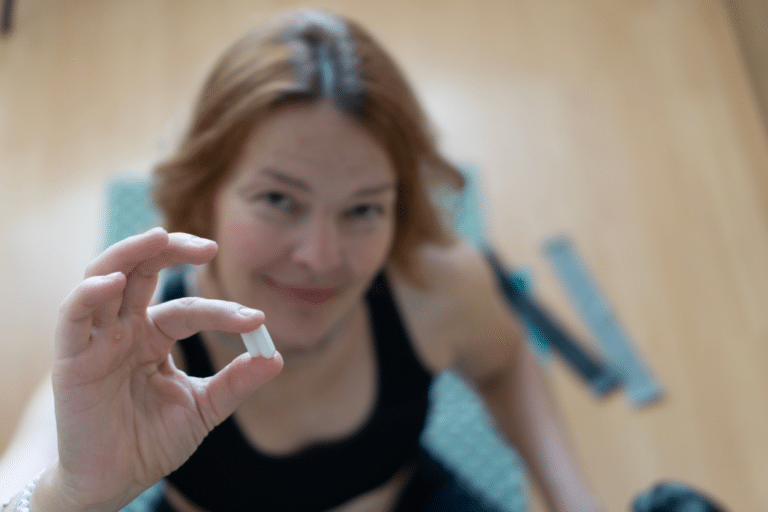Show me a woman in perimenopause or menopause and I’ll show you a woman who’s very likely to have anxiety as one of her primary complaints.
Many women believe that anxiety is purely related to hormone imbalance and it is true that imbalances in the estrogen/progesterone relationship, elevated cortisol, or hyperthyroidism can have an impact on anxiety.
But that’s not the whole story.
Anxiety is not a disease. It falls into a bucket of diagnoses that also include low energy, depression, fatigue, and irritable bowel syndrome. It’s an “arrow” to something else. Symptoms like anxiety are gifts, because they are messages from your body that something is off.
Anxiety is a Symptom from Within.
It is driven by your reaction to what is happening around you. Your choices in this situation are:
- Ignore it and keep going.
- Pop a pill to suppress the feeling.
- Adopt a numbing behavior to avoid dealing with it.
- OR take a day off, relax, listen to your body and be open to new perspectives.
Exploring Anxiety
If you are anxious, it’s important to ask yourself some questions to try to pinpoint the possible root causes. These root causes generally fall into blood sugar issues, poor sleep, high estrogen, low progesterone, and high cortisol.
Here are the questions to ask yourself:
- What is the specific feeling you are experiencing? (restless? overwhelmed? afraid?)
- When did it start?
- Does it happen all the time?
- If it’s AM only, this could be related to low blood sugar, crazy morning routine, dread of the day, bad sleep and thus, elevated cortisol.
- If it’s evening only, hypoglycemia, and elevated cortisol are suspects.
- If it’s monthly, it could be estrogen dominance, the full moon, or episodic financial problems.
- If it’s before a meal: hypoglycemia and elevated cortisol.
- After a meal: food sensitivity.
- 2-3 hours after a meal? Histamine intolerance, reactive hypoglycemia, hyperglycemia, or altered gut flora due to poor eating hygiene.
- What are you doing when you feel anxious and who are you with?
- Do you have any other symptoms that go along with it? (stomach cramps, hot flashes.)
- How do you sleep? (length and depth.)
- Do any of your medications cause anxiety as a side effect?
- Do you notice any other specific triggers? (ruminating thoughts, etc.)
Answering these questions can help you and your provider address the issue more directly.
The Most Common Root Causes
The root causes of anxiety can be situational, relational, or physical. The most common root causes include:
- Imbalance of stress hormones and neurotransmitters (cortisol, serotonin).
- Imbalance of estrogen/progesterone.
- Anything that increases cortisol or causes a surge of epinephrine or norepinephrine. These alone can cause anxiety AND if your body doesn’t metabolize these well with COMT, glucuronidation, or sulfation then they hang around a lot longer.
- Imbalances of GABA/glutamate. GABA is calming. Glutamate is like Ajax on your brain if it’s not processed properly. Glutamate converts to GABA, but if the gut is out of balance or you have genetics that lend themselves to glutamate back-up, you are more likely to experience anxiety.
- Your thinking! The body follows the mind and the mind is primed by the body’s expectations. Patterns of thought and reactive habits are very important to address.
- Cortisol dysregulation. Sky high cortisol can make you feel productive and accomplished …BUT, it promotes high blood sugar and increases oxidative stress on your body. Rock bottom cortisol promotes low blood sugar and causes chronic pain, both of which can make a woman anxious.
- Irritable bowel syndrome. People with IBS are 5 times more likely to have anxiety, regardless of the type of IBS.
- Nutrient excess (B-6, copper) or deficiencies (magnesium, glutathione).
- Poor gut health. Most of your neurotransmitters are made in your gut. An imbalance of gut bacteria decreases GABA production. A GI-Map test can identify which bacteria are out of balance. Email me at info@drannagarrett.com if you’d like to learn more about this test.
If you’re affected by anxiety, start by digging into the questions at the beginning of this article. These may help you pinpoint patterns and/or identify people or situations that trigger your anxiety so you can take action. Next week, I’ll address unexpected causes and the remedies you can try for relief.
Dr. Anna Garrett is a menopause expert and Doctor of Pharmacy. She helps women who are struggling with symptoms of perimenopause and menopause find natural hormone balancing solutions so they can rock their mojo through midlife and beyond. Dr. Anna is the author of Perimenopause: The Savvy Sister’s Guide to Hormone Harmony. Order your copy at www.perimenopausebook.com.
Dr. Anna is available for 1-1 consultations. Find out more at www.drannagarrett.com/lets-




